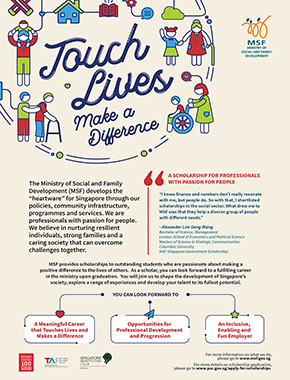Ashley Angela Toh Tian Ai is a Child Protection Officer, Child Protective Service Operations Strategy (Process Innovation). The Child Protective Service’s Operations Strategy branch spearheads data, technology and process innovations, as well as drives organisation development and strategic communications. The MSF Scholar has a Bachelor’s in Social Work with a Minor in Sociology from National University of Singapore.
Home is where the heart is.
But some children do not enjoy the safety and happiness that many of us take for granted. They go home to disruptive families, unsafe situations or a home that has remained empty for days.
Ashley recounted how she introduced herself when she first met the children she was assigned to work with: “I am a Child Protection Officer. My job is to keep you safe.”
“l felt that these were heavy words to say considering the extent of hurt and trauma that some of these children have endured, but they were a commitment to myself and to them that we would do what was needed to ensure that they were protected from further harm,” she elaborated.
Since then, Ashley has taken on different responsibilities in her current position in the Child Protective Service (CPS) Operations Strategy branch. The team works at the national level spearheading data, technology and process innovation to drive development and strategic communications within CPS.
A more efficient and effective CPS means more help for those who need it most. This is all the reason she needs to put in her best effort at work every day.
Tell us more about your role and responsibilities.
I’m part of the operations strategy team in CPS. Our team supports CPS’s ongoing transformative journey by adopting cutting edge practices to do child protection work more effectively and efficiently. For example, we lead engagements with other ministries and with community partners. Some projects I’m involved in include an initiative that looks into providing targeted support to Social Service Agencies to ensure upstream intervention for cases with low-risk child safety or well-being concerns, a research study into how the reunification of children with their families can be expedited based on CPS’s experience during circuit breaker, and a review of current referral processes to streamline the administrative work for our Child Protection Officers.
Prior to joining this team in 2021, I was in the Child Protection Investigation Unit and conducted social investigation into cases of child abuse and neglect. Investigation Officers work with parents, family network and community partners by ensuring the safety of children and young persons, such as by putting in place safety plans. In some cases, we may need to remove children from their homes when the child cannot remain safe at home. With the immediate safety of the child guaranteed, we are able to engage the parents, family network and professional network to ensure the sustained safety and well-being of the child.

Ashley Toh
When we talk about jobs in the social sector, most people think of Social Workers. How did your interest in macro-level planning and coordination come about?
My specific area of interest was cemented during my final-year internship at the Social Service Office (SSO) at Kreta Ayer. During this time, I was exposed to social work practice in an indirect setting. I was intrigued by the work of collaborating with systems to improve service delivery to do better for our clients. On a case level, social workers leverage the client’s formal and informal network to understand their current situation and address the barriers they face. Applying this perspective to the wider context, I became interested in the work of addressing these barriers upstream when I saw the SSO’s work in bringing partners together to support their clients.
In CPS, some of us look into advocating for children to have the best possible outcomes, and some of us look into measures or initiatives supporting the child protection ecosystem to address any safety or well-being concerns early on. The mission is the same – to keep children safe. Having the space within this job to exercise both case and cause advocacy is exciting work.
Why did you choose the MSF Scholarship?
MSF offers both operations and non-operation roles in serving a range of populations, from young and old, to families and the destitute. Having various opportunities under one roof meant to me that the work does not operate in a silo and would, by nature of the practice setting, be an integration of multiple sources of experience and expertise.
What did you take away from your university studies, and how do you apply it to your current work?
Taking a range of modules helped train me not in what to think, but how to think. Seemingly unconnected fields opened up my mind in the way I think and how I engage with various issues. For example, a module on discourse prompted me to pay attention to the use of language in shaping social issues, a module on climate change allowed me to learn more about people from different financial backgrounds and the different means they have to adapt to the impact of the climate crisis, a module on race left me questioning how we can conceptualise and organise the population in a way that does not perpetuate discrimination and inequality.
I maintain the spirit of inquiry from university learning by continuing to think critically about my work and talking to people around me, keeping up with my readings, and attending programmes within and beyond MSF.
We’ve seen the “Inside the Child Protective Service” documentary on ChannelNewsAsia, and the job is certainly challenging. How do you stay motivated?
It helps that there is a clear mission statement that reminds us of why we do what we do – that is to keep children safe. To that end, however complex or trying the work gets, all our effort as a service is to ensure that our mission of keeping children safe is actualised.
While some of the cases we encounter can be harrowing, it is also clear that most parents don’t set out to be “bad” parents. They may be parenting the way they were parented, or their behaviours may be symptoms of some erroneous beliefs or underlying conditions. In some of the families I worked with, I met parents who felt helpless or overwhelmed in their parenting journey but did not know how else to manage their children. It helped to hear directly from the parents what they wanted for their children and their families and find alignment between their goals and CPS. From there, I was thus motivated to problem solve with these families to find a way for them to function better together, while ensuring that their children remained safe through this process.
What is the work culture at MSF like?
Something that never ceases to amaze me about the work culture is how supportive everyone here in MSF is. No matter how much is going on, we are able to seek advice and support from one another.
This was especially tangible when Singapore entered Circuit Breaker in 2020. I joined MSF during that period. One of the first things I learnt about was how colleagues from other divisions readily stepped up to support CPS as safety monitoring volunteers. This was important work during a time when the children known to CPS were less visible in the community due to school closures. Having an army of volunteers who stepped up to conduct video calls to check in on children and their families helped CPS to keep children safe during those uncertain times.
Even when things are largely business-as-usual now, I continue to appreciate how empathically the staff here support one another across divisions in our day-to-day work. We’re just all in this together and we will see one another and our clients through!
What possibilities are there for people working at MSF?
There are many opportunities for ongoing learning and development. From the get-go, staff in the Rehabilitation and Protection Group are enrolled in a one-year onboarding programme that offers intensive courses, and networking opportunities with giants in the sector through learning journeys or dialogue sessions. This helps us to engage with the work of MSF beyond our own to-do lists. Besides learning about the work of our MSF colleagues, we also get to learn practical skills like how to do effective staff work and engaging in systems thinking.
Working in the ministry also means that you will also get the opportunity to work with many partners, such as other ministries, statutory boards or social service agencies in your day-to-day work. Being able to galvanise various parties to come together to serve clients better is exciting work!


